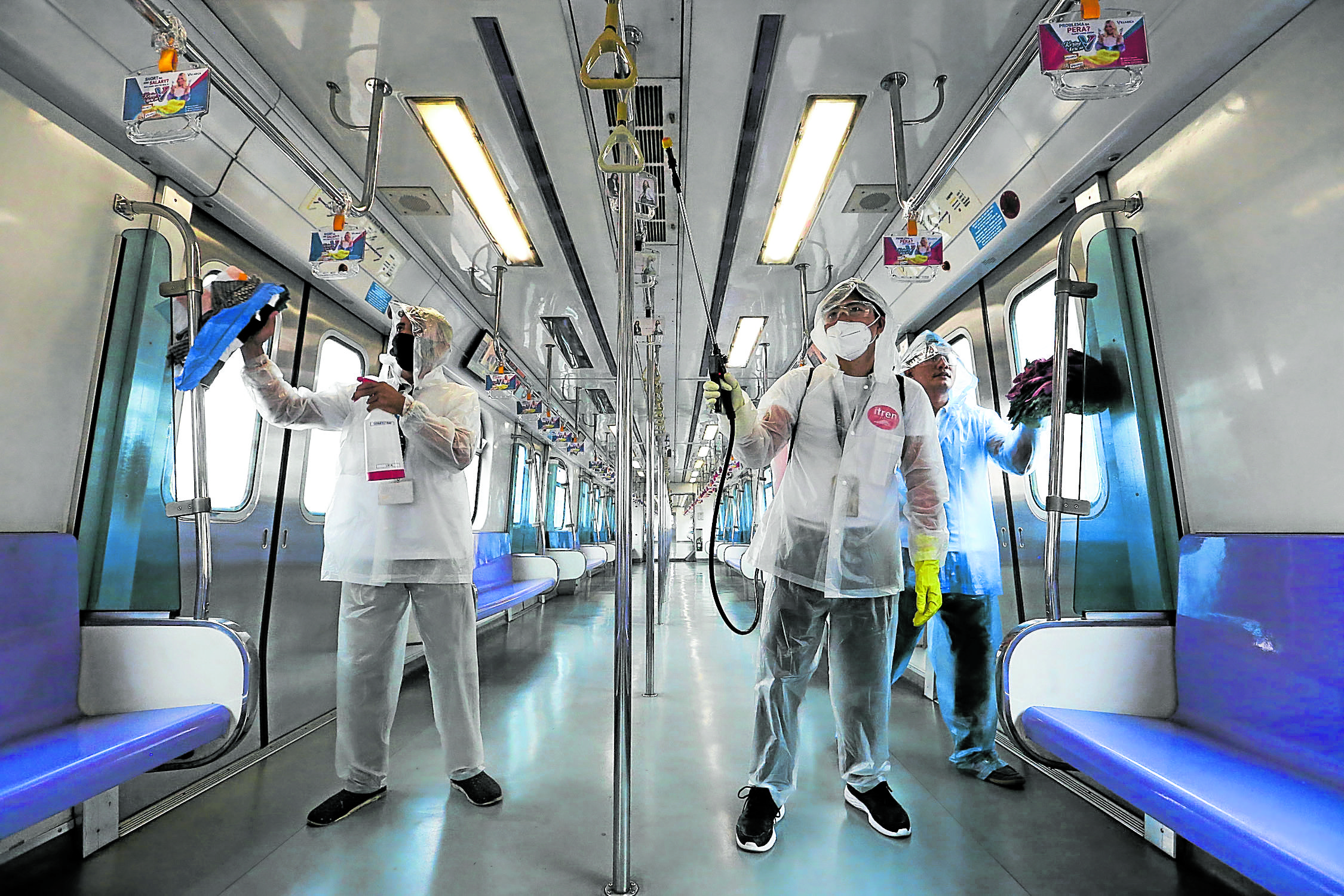
SPOT THE PROBLEM As the number of COVID-19 cases rises in Metro Manila, workers spray a chemical solution to disinfect handles, doors, seats, windows and other parts of an LRT 2 train that has just unloaded passengers at the Cubao station. One worker has no protective mask, while another does not wear gloves. —LYN RILLON
MANILA, Philippines — More than 300 workers of 19 tourism-related establishments have lost their jobs since February due to the coronavirus outbreak that has curtailed air travel, particularly from China, one of the country’s biggest tourist markets, the Department of Labor and Employment said on Tuesday.
At the same time, 47 companies with 4,416 workers have implemented flexible work arrangements, including shorter hours, reduced working days or forced leaves, according to Assistant Labor Secretary Dominique Rubia-Tutay.
Tutay said the businesses that shed workers were mostly in Central Luzon, Western Visayas, Central Visayas and Soccsksargen regions—among the country’s top tourist destinations.
She said the establishments that lost 300 workers were expected to be closed until April, June or August, depending on how their operations would return to normal.
The workers joined the ranks of 300 Philippine Airlines employees who were terminated because of the flag carrier’s losses primarily from travel bans and a slump in passenger demand caused by Covid-19.
Fewer passengers at Naia
In February, 595,000 fewer passengers were recorded at three of the four terminals of Ninoy Aquino International Airport (Naia), according to the Manila International Airport Authority.
The establishments that shut down or adopted flexible work schemes were mainly hotels, restaurants and a few manufacturers. Raw materials for these factories were either delayed or subjected to quarantine.
Trade Secretary Ramon Lopez said the industries taking a hit from supply-chain disruptions caused by Covid-19 included aerospace, airlines, auto parts, bananas, footwear, garments, and iron and steel.
But Lopez said manufacturing activities elsewhere in China outside Wuhan City and Hubei province — where the outbreak started — were already “normalizing.”
He pointed out that Wuhan and Hubei accounted for only 1 percent of the Philippines’ trade with China. Last year, China was the country’s top trading partner — the biggest source of imports and the third-largest export market.
The National Economic and Development Authority (Neda) expects job losses in the tourism sector to be between 30,000 and 60,000 if the epidemic lasts until June.
Bangko Sentral Deputy Governor Francisco Dakila Jr. said the outbreak may also slow inflows of foreign direct investment, trade and remittance of Filipinos working overseas.
A total of 734 Filipino workers in Macau have been displaced due to the outbreak in the Chinese special administrative region, according to Tutay.
Neda estimates released on Monday showed a potential reduction in output, mainly in the trade and tourism sectors, by P93 billion to 187 billion, equivalent to 0.4-0.9 percent of gross domestic product (GDP).
The reduced output may lead to a 0.5-1 percentage point cut in GDP growth this year should the outbreak persist until June. The government targets a faster 6.5-7.5 percent growth rate this year.
Not worrisome
After the Economic Development Cluster (EDC) meeting on Tuesday, Finance Secretary Carlos Dominguez III said that as far as the Philippine economy was concerned, the spread of the virus in and out of China was not worrisome. “We’re not teetering on anything.”
Dominguez said the EDC approved an additional P2.92 billion in funding for Covid-19 response, which will cover additional testing, augmentation of contact tracing and surveillance, as well as purchase of protective equipment for medical and health care front-liners.—With a report from Jerome Aning

